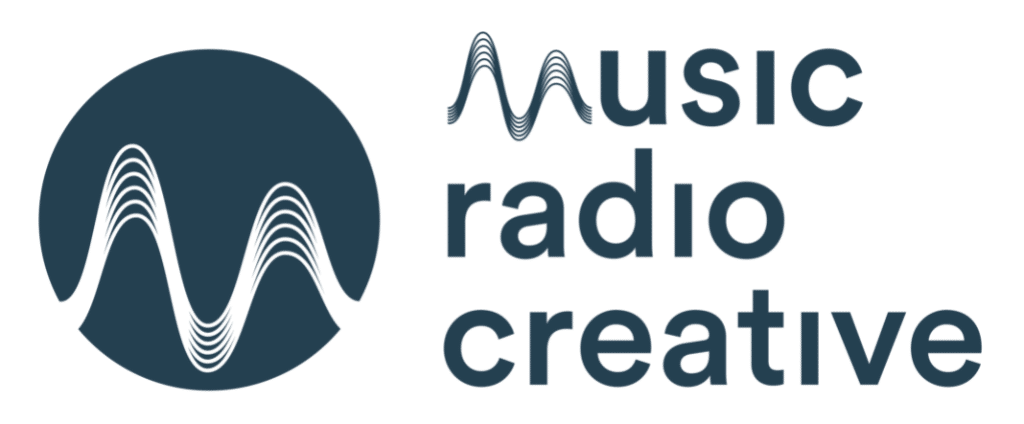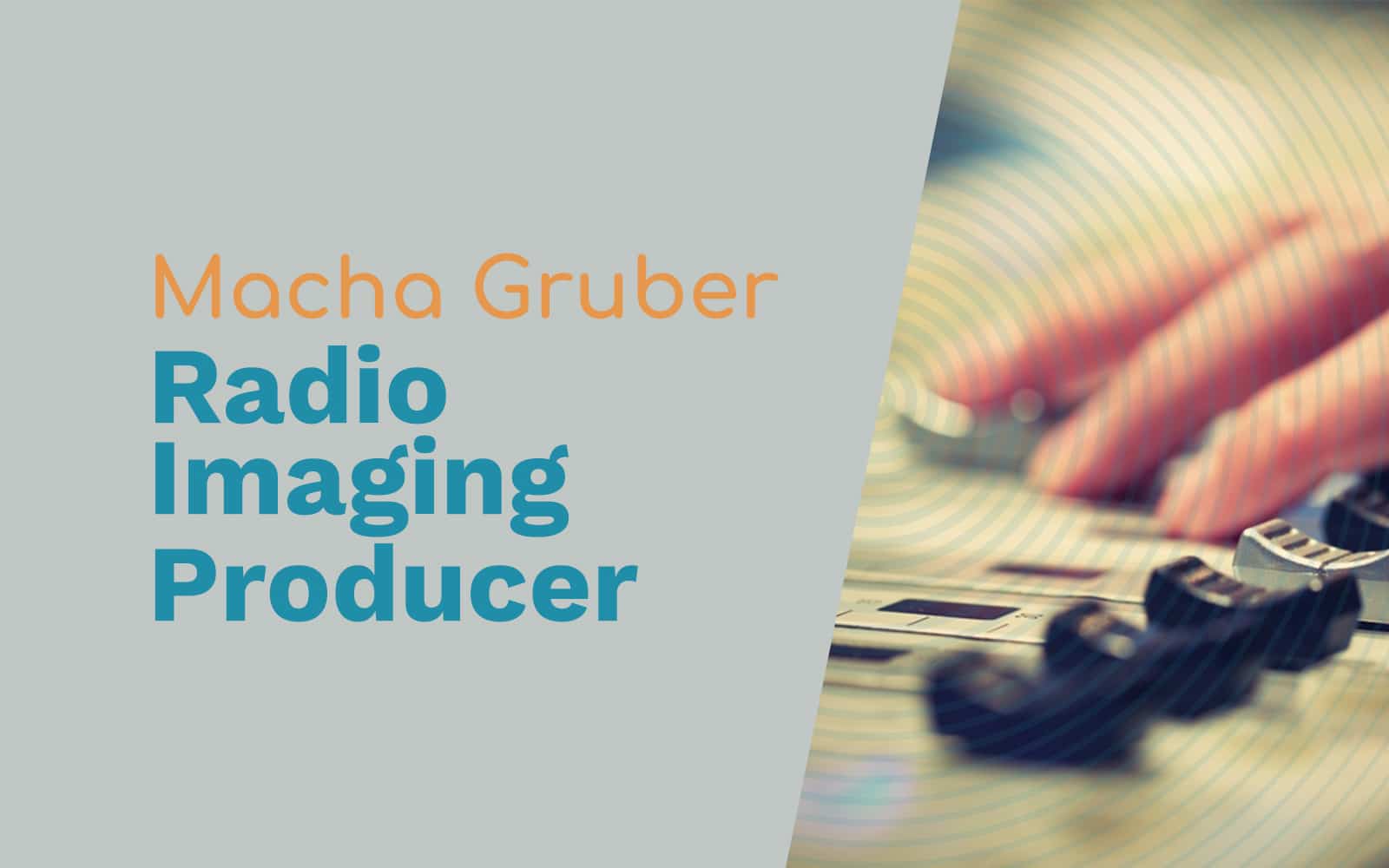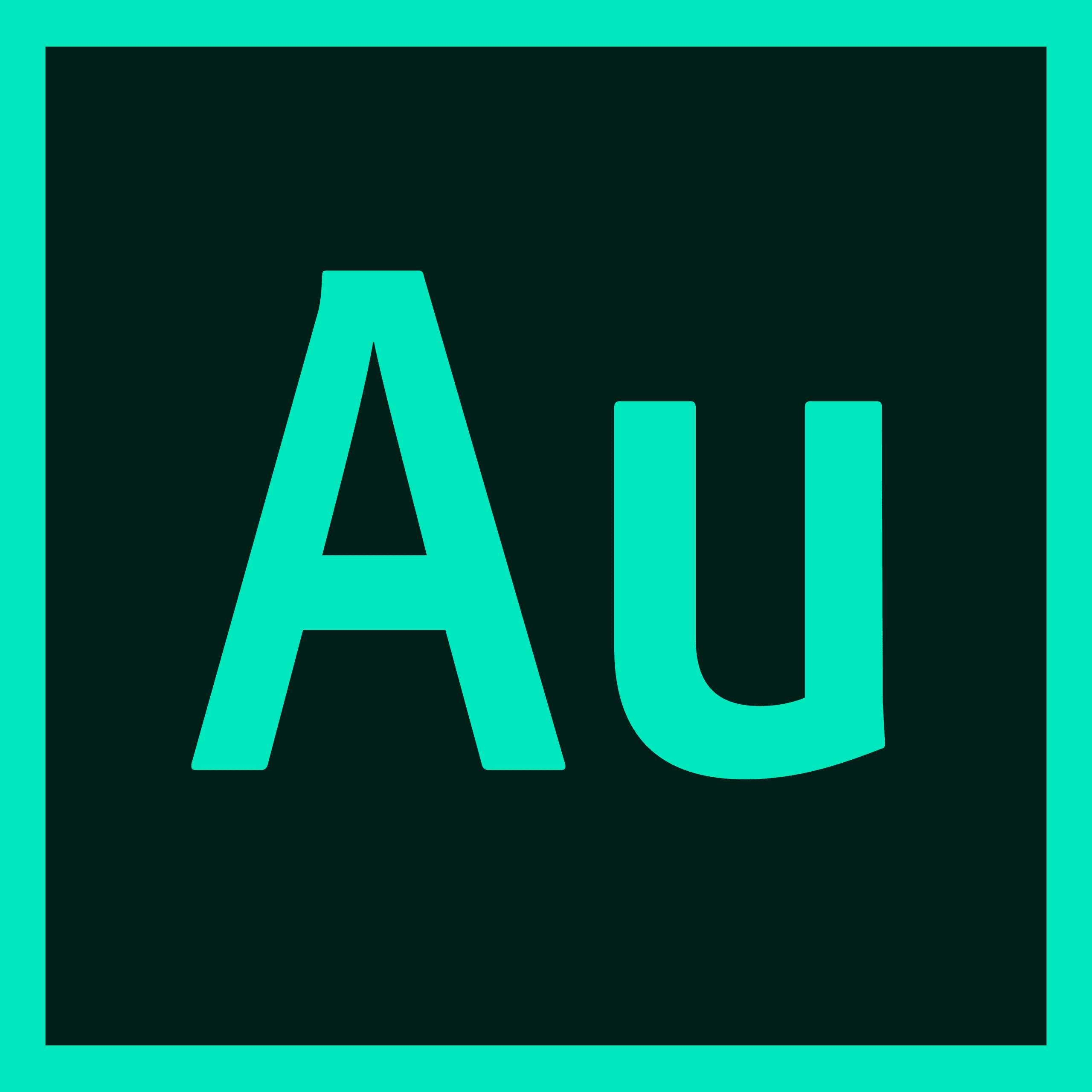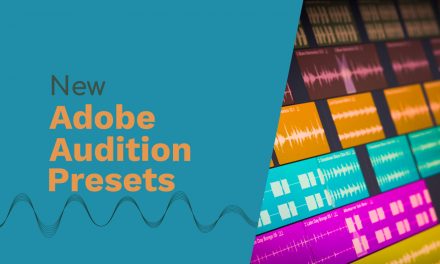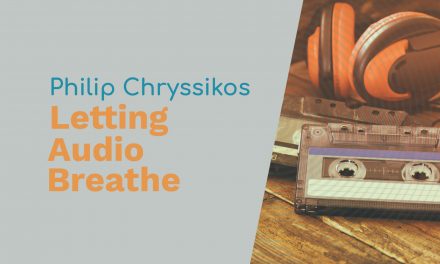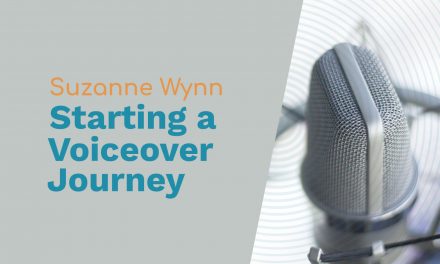Adobe Audition Podcast – Macha Gruber (transcribed by Sonix)
Mike Russell.wav: Hi, I’m Mike Russell from Music Radio Creative. Welcome to the Adobe Audition Podcast were I’m interviewing power users of Adobe Audition. We’ll reminisce back to Cool Edit Pro and take you right up to date with Adobe Audition CC. If you’d like to learn about audio production – everything from vocal effects to radio imaging, commercial production to music mixing – join my next audio production course at mrc dot fm slash learn. That’s mrc dot fm slash l e a r n, learn.
Mike Russell.wav: My guest on this show is Macha Gruber. She’s a professional demo producer, voice over talent, radio imaging producer, and she generally slays all things audio out of Atlanta, Georgia. She spent around 10 years in audio advertising from writing to voicing, sound designing, as well creative commercials. We’re going to get so in-depth I know in this show into how much is using Adobe Audition. She’s also been imaging for top ten market radio. She’s now been free from corporate shackles. We’ll have to find out how long and is dedicated to helping others shine by creating expertly produced voiceover demos and lending her voice to many fun projects. She’s got a website which we’ll explore at the end of this episode but it’s fantastic to have you on the show, Macha.
Macha Gruber.wav: It’s so great to be here Mike.
Mike Russell.wav: Wonderful. So how long, first of all, before we get into Adobe Audition. How long have you been free of corporate shackles for?
Macha Gruber.wav: I was laid off last May. So
Mike Russell.wav: Laid
Macha Gruber.wav: It’s
Mike Russell.wav: Off
Macha Gruber.wav: Been just over a year and a half.
Mike Russell.wav: Untested and are you finding it good.
Macha Gruber.wav: Yeah yeah it kind of turned into a sink or swim situation where I wanted to take a little break from radio because I was in radio for the better part of you know on and off 10 years. So when I when when they laid me off they removed my position. I decided I was like you know what. Let me try something on my own just for a little while just to see how I do. And it turned out to be really great.
Mike Russell.wav: Very cool. Now I understand you doing everything from voiceover to radio imaging and any kind of audio appetising. You must be using Adobe Audition. Plenty in your work. So how exactly are you using it on a day to day basis.
Macha Gruber.wav: Every day.
Mike Russell.wav: Wow
Macha Gruber.wav: Yeah I have my I’m using a Zoubi audition 20 18 CC and I do everything from an I record all my auditions for all of my agents I do remote recording sessions with other clients that are making demos for. I do all of my production. Radio imaging and commercial production on there. And it’s my daily driver and I wouldn’t think of go into anything else.
Mike Russell.wav: Nice. Yeah and I think the the reason is is just so fast and easy to use and I guess with things like imaging as well you’re using plenty of the effects too I would guess.
Macha Gruber.wav: Absolutely
Mike Russell.wav: Great. I’m looking for to get into that soon. Let’s let’s go back a little bit to when you were maybe starting maybe maybe 10 or so years ago in radio maybe you were. You were learning about audio production. Is there any advice over the years that you’ve received that you found to be really helpful.
Macha Gruber.wav: Oh yeah. One of the best pieces of advice I’ve ever had as far as production is concerned is nothing technical. It’s about using your ears. And when you produce something in your home studio you’re so used to how that home studio sounds take that piece. Mix it down and listen to it somewhere else go in your car. Put it on your phone and always have like three or four different ways of listening to your audio because you’ll be able to hear so many more different things than you could if you were just sitting in your studio and you know just going back to reference everything because you may think that sounds great and you played in your car and it sounds like crap.
Mike Russell.wav: That’s it. And it’s you’re absolutely right. Particularly with volume levels do you ever find that you get after a while you just get fatigue because you think I’m not sure of
Macha Gruber.wav: Oh
Mike Russell.wav: The sounds
Macha Gruber.wav: Yeah.
Mike Russell.wav: Good on know anymore.
Macha Gruber.wav: Oh absolutely. I was like oh this sounds great. And then I’ll mix it down and then I’ll wait till the next day and up like I need to fix all of it.
Mike Russell.wav: Yeah you notice the little things
Macha Gruber.wav: You know specifically the frequency levels you know it’s like the volume levels kind of mess with. But as soon as the frequencies hit it’s like you start losing frequencies the more fatigued your ears get.
Mike Russell.wav: Very tree.
Macha Gruber.wav: So yeah I know
Mike Russell.wav: Yes.
Macha Gruber.wav: That’s too high it’s too high. I’ve got to go run back and fix everything.
Mike Russell.wav: That said yeah you notice all the little things the more and more you play it back. So talking about that talking about you know listening time and time again and working on making things as perfect as we can as audio produces. What would you say is the most challenging approach have you much of the you’ve ever worked on as a producer.
Macha Gruber.wav: I was asked a few years in a row to do. It’s called here the 48 Hour Film Project and it’s basically a bunch of filmmakers get together. They do it all over the country in the US. I don’t know if they have any over there but it’s a whole bunch of filmmakers get together they get a scene. They get a prop they get a line and they have 48 hours from writing to credits to make a movie. It’s like a short six minute film and then they go and then they present it and then they can go you know enter into all these different contests and they go and prizes. And so a couple of filmmaker buddies of mine hit me up and they said would you like to do the post audio for this. And I said. I do radio audio. I don’t know how to do any of this until I believe in you. OK. So I spent probably the better part of 20 hours from Saturday night to Sunday evening fixing sound designing and completing post audio for this six minute film and it was probably the most challenging thing I’ve ever done in my career. But the most fun I’ve ever had with audio
Mike Russell.wav: Wow.
Macha Gruber.wav: Because when you start putting video to audio it opens up a completely different part of your creative brain where you know if your sound designing a commercial or a piece of radio imaging you have the theater of your mind. You know you have the theory of the mind in your head and so you see OK well the guy is coming in the house and he opens the door and closed the door so you have to you have to watch that in your brain when you could actually put it to film and you can see it. It opens up this whole other part of your brain to where it’s like OK he’s opening the door. This is where he needs to put the door opening sound OK. He’s closing the door. There’s the footsteps. And so it took me forever to really get my groove in it but once I started it was the most fun I’ve ever had working with audio audio to film.
Mike Russell.wav: What an amazing thing and to me that sounds really scary so much. I have a background in radio. Yeah and I’m like if somebody else is a mix refilm I’d be like I’m definitely out there. But I guess you learn a lot from the experience right.
Macha Gruber.wav: Absolutely absolutely and like I said when you open up that other part of your creative brain it it just can open a world of possibilities. It’s like I think that you know my like the actual mixing of it sounded way better because I was trying to mix it to all of these different scenes into all of these different cameras because of course these are amateurs you’re working with so you know they don’t have all of the professional gear that you know a lot of movie studios have and they don’t have onset sound mixers. So they did everything by ear from themselves saying OK I guess this is great. And then they sent it to me and I had to I had to do all of this fixing and a lot of noise removal because you know one scene was in a warehouse. One scene was in a bar. One scene was outside and they didn’t have any time to do ADR. They didn’t have any time to do fixing and you know and all of this so I had to like fix everything all at once and it was so cool just to see the process of it. I’m sure professional you know post sound people have a way different time with it and it comes way easier to them. But for me going from just strictly audio to audio to video it was a lot of fun but it was that scary big challenge and I did three of them. Since then.
Mike Russell.wav: Wow. And did you need to teach yourself new tricks and techniques. For instance guessing from radio imaging you were compressing lots and lots of a cue and that’s totally not applicable in film. I would I would imagine
Macha Gruber.wav: No. No. Fortunately for me the radio imaging came after commercial production so I was able to do you know the noncom pressed I was able to do the natural sounds WAY easier. And so when I started getting into imaging it was harder for me to make everything sound bigger and bolder because I was like we no know that that’s not right.
Mike Russell.wav: Yeah.
Macha Gruber.wav: But then you know you have to realize you’re working in a different medium so working with the film was a lot more like working with commercial production in that aspect of sound designing commercial production versus sound designing radio imaging.
Mike Russell.wav: Osgoode it sounds to me like you did it the right way around them because you learned the natural start of production and then you worked into radio imaging where as I started in radio imaging thinking everything has to be really compressed and sometimes I think no I need to just turn that down.
Macha Gruber.wav: Indeed indeed. The hardest part of that was the noise removal and I had several different types of plug ins from several different Plug-In companies. And hats off to Adobe Audition because I ended up using their noise removal over everybody else’s.
Mike Russell.wav: Nice. That is it’s very good definitely. That’s fantastic. So OK we’ve looked a little bit a challenging project something that’s really taken you out of your own creativity in taking you even further but if you were to project further into the future now you’re working for yourself and doing all these really cool projects. Is there anything really cool in your imagination right now that youd like to work on maybe a secret project that you haven’t told anyone about just yet. In order
Macha Gruber.wav: Loved go back to doing audio to video like animation sound design is really what I would love to start doing. There’s two things animation sound design and creating promos for television like sound designing promos for television like the. Coming up next on Modern Family that stuff.
Mike Russell.wav: Oh wow cool yeah that’s that’s interesting so. Wildest Dreams. Like what kind of show would it be like or channel would it be like. FoxHollow something like that. A Disney movie or all of the above.
Macha Gruber.wav: It really all of the above. You know it sounds sound designing for video is the same all around depending on what you’re doing. I love doing drama. I love doing like movie trailer style stuff. You know any time I could use Big Bad strings and tribal drums on it.
Mike Russell.wav: Nice
Macha Gruber.wav: But anywhere from you know happy fun cartoon to adult cartoon to a Pixar movie to you know the next Halloween movie the next horror film any of that you know trailers and promo and animation and all of that stuff is so interesting to me because it’s kind of like the imaging world you know it lays very very low in that in that totem pole. But network promo TV promo trailers and stuff it’s more in the line of radio imaging because of the way that they’re built inside the session.
Mike Russell.wav: Absolutely yeah. And I mention actually in your bio about sound design. Tell me tell me a little bit about your experience with sound design because that always interests me.
Macha Gruber.wav: No I’m not that great at it but it’s fun to do. Usually if I can’t find a sound that I need and it happens a lot in imaging if I can find a sound that I need I’ll make one I’ll take an old sound or I’ll take a different sound layer it with another one and I’ll produce you know and add effects and then I’ll turn it into something completely different. Same thing with Foley. I like to do Foley. I’ll take it if I can’t find specific chewing sound or I’ve drank like a gallon of Gatorade once just to get the right gulping sound. I’ll do that. I’ll record my own sounds with Foley as well. And then sometimes I’ll take those and I’ll just add a crap ton of reverb and delay on it and then call it an actual whoosh. You know
Mike Russell.wav: Absolutely. Well you say you know very good bye. I think it all just starts with an idea an experiment and just placing things together. And that’s that’s a lot of the fun of Odeo isn’t it it’s just you never know what’s going to come out the speaker. When you when you click in effect or mix a couple together.
Macha Gruber.wav: Absolutely yeah.
Mike Russell.wav: So let’s let’s talk about before we get into Adobe edition. I’m really very interested to hear about how your using the software you say you’re on the latest version using it. But before we get there let’s move back to your childhood and find out exactly what it was. Maybe you have one memory around Oreo that makes you smile and possibly send you down this whole path that Iran now is. Is there anything for you much of that that sort of started the whole
Macha Gruber.wav: I am actually a second career producer. I never even thought about audio or radio or any of this until my early 20s. My first Courrier I went to I went to college and I wanted to be something completely different than an audio producer and voice over. And then I got so wrapped up in this career while I was in school where I didn’t really see anything else I didn’t see any other opportunity. I didn’t see any anything else for me. I had blinders on. I wanted you know I was going from here to here to here to here and then that was my life. And I’m done. So my. I moved from New York I grew up on Long Island in New York and I moved to Georgia to go to college. I was 18 years old and I went to a concert. A friend of mine’s cousin had a band and I went to this concert and I realized I was like oh this is fun. I’ve never done this before. You know none of my friends at college go to concerts. I’m like oh this is cool. I’m at a concert and then I started meeting different people and all these different people from all of these different walks of life. And I realized hey there’s a whole other world out there that I don’t even see because I have these blinders on because I’m so focused and I’m so determined to get through this career. So fun fact I was going to school to be a chiropractor
Mike Russell.wav: I’ll right so something totally different.
Macha Gruber.wav: Yes completely different that audio. So a buddy of mine I started making all these different friends and all these you know all these shows I was going to and his buddy asked me he’s like hey do you wanna do a radio show with me. I said no absolutely not. I have nothing to do with radio. He goes Well I think he’d be good at it and it will be a lot of fun and he kind of twisted my arm into and I was like OK fine. So I had a Metal Show on this pirate radio station on shoutcasting
Mike Russell.wav: Cool.
Macha Gruber.wav: Early 2000s and I was playing metal and I was talking to people and I downloaded my first copy of audacity because I had a feeling that we needed to make promos nobody was doing promos for the other shows that was on this network.
Mike Russell.wav: That’s where it all started.
Macha Gruber.wav: Yes well people need to hear me so the people who listen to you know the indie show is going to want to listen to the metal show or blah blah blah. And I was like I want to make a promo. So I downloaded audacity and I taught myself how to put together a very simple basic spot. And so from there you know I used reverb. You know I don’t even know how I learned all of this and I’m sure a couple of online tutorials but it was you know they weren’t as abundant as they are now
Mike Russell.wav: Yeah that was going
Macha Gruber.wav: And
Mike Russell.wav: To be my next question actually how did you learn. So kind of self-taught. Did you have that. Was there anyone around who could like help you. Or
Macha Gruber.wav: Now
Mike Russell.wav: It was all kind of experiment and that’s cool. Wow.
Macha Gruber.wav: Yeah it was just ok. I know I have to put a voice down and then I know after my voice I have to put some kind of music and or sound effects. So there was a lot of you know googling involved but the internet wasn’t as abundant as it is now. So it was tough but I did it and I made a couple different little sweepers. So proud of myself. And then I realized I got bitten by the audio bug. So I left chiropractic school and I went to broadcasting school and I said I’m going to be on the radio. And that was it. And that’s when I fell in love with the actual passion for completing you know audio projects and voice over And all of that and then I quickly realized that it want to be actually on the radio. I did a couple of air shifts here and there but I didn’t want to do any more of that because it got really redundant and I wasn’t really that into being in the limelight as much as I thought I was. I had a teacher in broadcasting school and this is again this is not my childhood this is early 20s mid 20s. Teacher he was an imaging producer and he taught very basic imaging in one day. I stayed late after class and I said I want him I want to make a full promo. Can you. Can you voice something for me and can I voice something and can we do like a dual spot promo. He’s like Sure. And he sat with me for hours and helped me put together this promo that I never would have been able to do if it wasn’t for his guidance. You know like I was mainly self-taught so he was teaching me all of these different things like I was like well my mind was blowing like every single minute he was showing me something. Bam bam bam. And that was it. That was I was done.
Mike Russell.wav: That’s
Macha Gruber.wav: I was done
Mike Russell.wav: So
Macha Gruber.wav: At that point
Mike Russell.wav: Cool
Macha Gruber.wav: And forever more an audio producer.
Mike Russell.wav: That’s where it all starts. I love that story. It’s fantastic. And I can relate to what you’re saying about being on the air because that’s kind of almost how it starts. I like the way you said that you and I started with you know a friend of yours saying come on come on the radio and you’re like I’m not sure I started my career thinking I want to be on the radio. But then I soon discovered later on that actually you can have far more fun in the production studio pushing pushing buttons and playing sound effects and creating
Macha Gruber.wav: Oh yeah yeah yeah. You don’t have to worry about listeners you don’t
Mike Russell.wav: No
Macha Gruber.wav: Have to worry about people asking you for tickets.
Mike Russell.wav: Exit.
Macha Gruber.wav: It’s great.
Mike Russell.wav: It’s so true so true. Yeah and those those contest Collas as well the the the I don’t know what kind of radio stations you were on but you get the regular callers that were calling for every contest and yeah for sure. So all right then so let’s look at how you using Adobe Audition today. Let’s start with that one magic feature. If you had to just isolate one thing I know you mentioned how much you like noise reduction. But there’s one effect or feature anything in all addition. What would be your favorite.
Macha Gruber.wav: I love the media browser. I think
Mike Russell.wav: Oh
Macha Gruber.wav: That’s probably one of the coolest features of the newer generations of Adobe. You know back in. What was it o’th 3.0 you were able to try to open a file and then auto play through it and then they got rid of it and then all of a sudden it came back in this little box in the media browser on the sidebar. You know I’m talking about is there another name for it.
Mike Russell.wav: Yeah no it’s actually cool. Yeah you’re right the media browser. And it’s
Macha Gruber.wav: Yeah.
Mike Russell.wav: It’s just fantastic isn’t it. Yeah.
Macha Gruber.wav: Oh yeah yeah. You set up your favorites like I have on my shortcuts. I have sound effects. I have music beds and so all I have to do is just open those folders and boom boom boom boom boom find what I need and drag it right up. I think it is a fantastic little tool that and the effects rack in the same in the same area where instead of having to go to the mixer I use a dual screen. So instead of having to go to the mixer all the time which is all the way across the screen I could just open the effects rack and then you know individually put effects on individual clips and put effects on individual tracks. And I think I think that’s a fantastic feature. I love that so much
Mike Russell.wav: That’s a super cool way of doing things I like it with the dual screen as well and it’s brilliant because I think you are the first person that mentioned the media browser such if you think about it what would you do if you didn’t have that you know especially with imaging where you want to skip through really quickly and find the right fact you’d have to be going through your browser will find the windows and you know auditioning each one. It would be yeah
Macha Gruber.wav: There were so many people unhappy with it. When when we lost the auto play function in the actual preview screen and I just remember somebody complaining about it and I was like oh wait here it is. I think it came in on CSX CSX or CC like the original CC. Yeah I just I randomly stumbled across it. I was like oh my gosh this makes life so much easier right now.
Mike Russell.wav: Definitely.
Macha Gruber.wav: And you have is all the technical stuff and you know the the ability to destructively edit and waveform and then nondestructive we edit multitrack like I am a hardcore Adobe user you know and people like you should switch to you know another da. I don’t want to name any names on the adobe podcast but. I’ve tried I have tried. My boyfriend is a music producer and I’ve tried to switch to other ones and just for the ease of only being on one daw at a home and it just doesn’t work for me. Adobe is my daily driver
Mike Russell.wav: Korth bias of your boyfriend’s working in music. Then he’s going to need a different door. Maybe maybe for the Mitie opportunities and things like that. So
Macha Gruber.wav: Yeah
Mike Russell.wav: It’s a whole different
Macha Gruber.wav: Yeah he
Mike Russell.wav: Game.
Macha Gruber.wav: Does he has many a lot
Mike Russell.wav: Yeah. Awesome. So well that’s brilliant. So you’ve already mentioned how you using the media browser to quickly find what you need and the effects rock. Like you say either way from viewing the multitrack getting different effects to different tracks but maybe you can share with us some some other amazing workflows or timesaving shortcuts or just routines that you regularly have inside audition. Make life easy for you.
Macha Gruber.wav: Every every version of Adobe I own or every version of Adobe I touch. I add an insert silence shortcut. I don’t know if there’s an actual like a different shortcut but I always do like shift s so as I am editing because I deal with a lot of dialog I deal with a lot of voiceover And it’s just way easier to edit all of that out in way form first instead of pulling it into multitrack and then just pulling out the breaths here and there because breaths are the bane of my existence. So what I’ll do is I’ll add. I’ll insert silence and so if I’m going through a track shift ass and then I do like when you pull up the insert silence it’ll pull up an actual time so I’ll do like point 2 and so point 2 seconds or point I guess twenty point twenty seconds. Either way if you do Pt. 2 on insert silence it’s just enough time to get to the next part of the voice over without it sounding too close. If you’re removing a breath because a lot of people just delete breaths and then everything is smashed together it doesn’t sound natural and it will point to seconds to point three seconds will give you just enough natural time to let whatever you’re working on breathe. I do point to point three point five point five is good for a paragraph. So as did one of my things I insert silence all day long because I’m just getting rid of breaths. I’ve tried the breath removal. I don’t know if I’m misusing it but it’s not working as well as as well as I need it to. So I just manually do it with the inserts silence and if you’re if you’re doing it dry and if you have background noise and obviously you want to pull an actual room tone but if you’re just putting it over music or if you’re putting into a piece of imaging you don’t really need any of that room tone in there so insert silence is my boo.
Mike Russell.wav: That’s fantastic that’s really good and yeah having that on a whole and being able to quietly insert the silences you need to keep the dialogue flowing that is fantastic. So what about your go to resources when creating audio that could be like a website to use production libraries plugins. Maybe you use anything at all that helped me to be even more creative. What would you recommend
Macha Gruber.wav: I am a big fan girl for Jeff Schmidt and alien imaging.
Mike Russell.wav: Oh yeah.
Macha Gruber.wav: I love his stuff. As far as his production libraries go I think they’re fantastic and they sound badass. I use audio blocks for my music. Thinking about changing so if anyone has any other recommendations on music music libraries to use I will take those. I will totally recommend isotope R x. I just got the R x 7 and they just released it had our XXIX for a little while and I just got our x 7 and that is a voiceover or anyone who works with voice. It’s a lifesaver. The mouth click is probably the best function’s I’ve ever seen
Mike Russell.wav: Really.
Macha Gruber.wav: In a plugin.
Mike Russell.wav: Wow.
Macha Gruber.wav: It’s super accurate. It’s Superclean. All you have to do is you can either throw it on the track itself they have a little editor you can add it separately or you can throw it on the track as a plugin and you could just sit there and watch all of the clicks be removed and you know a 30 second clip will have sometimes 140 clicks in it and I’m talking about the mouse clicks like the.
Mike Russell.wav: Yeah.
Macha Gruber.wav: You could probably hear my voice now because I just
Mike Russell.wav: Yeah.
Macha Gruber.wav: Like coffee. Yes. Yeah. That nasty like that sound. And I know that Dhobi the spectral view is great for for editing those on the fly. If you don’t have any type of restoration blood you yeah the spectral view is a lifesaver also because you can just see them and scrub them that way but if you’re working with a lot of audio all at once a lot of voice over the tricks are 6 6 or 7. Standard Version has Malph de click
Mike Russell.wav: So it’s just one hits. Apply the effects and done
Macha Gruber.wav: Aha
Mike Russell.wav: Cool
Macha Gruber.wav: And gone. Yeah and it does it doesn’t create any anomalies. If you use it sparingly I mean that you’ll get just about 95 percent of the clicks and you won’t even hear a difference between the two piece of audio other than no clicks on it.
Mike Russell.wav: Wow. Lovette
Macha Gruber.wav: There’s a couple other restoration restoration things in the are x 7 packages like d d d noise D breath control. I hadn’t really played around with all the new stuff yet.
Mike Russell.wav: So much. Especially if you’re working like you said with dialogue on a regular basis.
Macha Gruber.wav: Yes.
Mike Russell.wav: You need these
Macha Gruber.wav: Yeah.
Mike Russell.wav: Tools. Yeah
Macha Gruber.wav: Absolutely. This is probably the best voiceover dialogue plug in I’ve seen or it’s a bundle you can’t buy them separately unfortunately but you can get the bundle of it and a D plosive D reverb spectral D noise voice D noise D clip D click Yeah it’s it’s fantastic.
Mike Russell.wav: Every kind of artifact that you could imagine being there is
Macha Gruber.wav: Right
Mike Russell.wav: You’re able to take it out which is a kind of magic isn’t it. Yes. And you mentioned as well about music libraries and imaging libraries. Yeah I agree. Alien imaging is fantastic. If anyone listening wants to wants to write in the comments and recommend some music Libre’s on a ton of sites and places but it’s always good to have more resources as I always get to know more imaging library says this because after a while
Macha Gruber.wav: Indeed.
Mike Russell.wav: You are producing with one and you kind of get bored of anything. Ok I am I either need the produce released another you know series or find something else. Do you find that
Macha Gruber.wav: I do. Do you know especially with the buyout libraries you know not being attached to a station you can’t get the barter libraries which the barter libraries usually have the best stuff like Bend’s town. But you know as as a single producer you need the buyout libraries and you need the ones where people are just releasing sounds into the world and you could just pick them up real quick.
Mike Russell.wav: Yeah put them all together. Cool so well much has been great to join and I’m just wondering now if someone is listening to this show and they’re young and an aspiring producer maybe they’re thinking about a career somewhere in the audio industry. What kind of advice would you offer right now to the
Macha Gruber.wav: Be the best you can be you know. Keep practicing keep experimenting. Don’t be afraid to be weird don’t be afraid to you know do something that you’ve never heard before because it could be the next. It could be the next trend. It could be on the next you know the next cycle of what’s popular. If you’re working with you know voice over be sure not to squash them too much. You know people like to hear a very clean voice over In the commercial world in the emerging world don’t squash it too much either you know to where it’s not bright and and playing with it with the sound effects and the music. Always use your ears you know go different use different types of speakers to listen to your finished work to make sure that it sounds good. Always use a mano speaker as well.
Mike Russell.wav: Lie that
Macha Gruber.wav: A lot of times you know you could be producing something in stereo. And you know your phone is actually a really good tool for a mono speaker. So if you have if you don’t have one of those fancy phones with stereo speakers on it.
Mike Russell.wav: You have because of Fey’s
Macha Gruber.wav: But
Mike Russell.wav: Cancellation.
Macha Gruber.wav: If
Mike Russell.wav: You don’t want any anything canceling out
Macha Gruber.wav: Yeah yeah I mean there’s been so many times where I had to I had to flip flop stereo stuff or you know I had to make sure they were out of phase so using a mono speaker is really good at that. Also something that you could bring it back to that first question about the best piece of advice is to listen at a really low volume when you think you’re done. Because if you can still hear every piece of element in the low volume then you’ve mixed it OK if you know you only hear the music or you only hear the voice over then it probably needs a little more work to it.
Mike Russell.wav: Great advice and it also saves you raise as well doesn’t it.
Macha Gruber.wav: Never yeah don’t listen it’s super loud volume because you’re going to need your ears for
Mike Russell.wav: Unless
Macha Gruber.wav: A while.
Mike Russell.wav: It’s heavy metal.
Macha Gruber.wav: Even heavy metal I don’t listen to it aloud.
Mike Russell.wav: Nice. Oh well much. Thank you so much for joining me unfelt. Anyone who’s interested right now listen to the show. Really excited to find out more about you where can they find you online.
Macha Gruber.wav: Macia creative dot com or on Facebook Macia Gruber or Macia creative Instagram Macia creative. I don’t use twitter but I’m on their Macia creative anything Magia creative you could find me. And if you need a demo just let me know.
Mike Russell.wav: That’s great. Thanks so much for joining me
Macha Gruber.wav: Yes. Thanks so much for having me. This is a lot of fun.
Mike Russell.wav: That concludes this episode. Subscribe and review this podcast to help others discover the power of a double dish and if you’d like a full transcript of the show. Head over to MRC dot fm slash a p. Thanks for listening.
Sonix is the best audio transcription software in 2018.
The above audio transcript of “Adobe Audition Podcast – Macha Gruber” was transcribed by the best audio transcription service called Sonix. If you have to convert audio to text in 2018, then you should try Sonix. Transcribing audio files is painful. Sonix makes it fast, easy, and affordable. I love using Sonix to transcribe my audio files.
